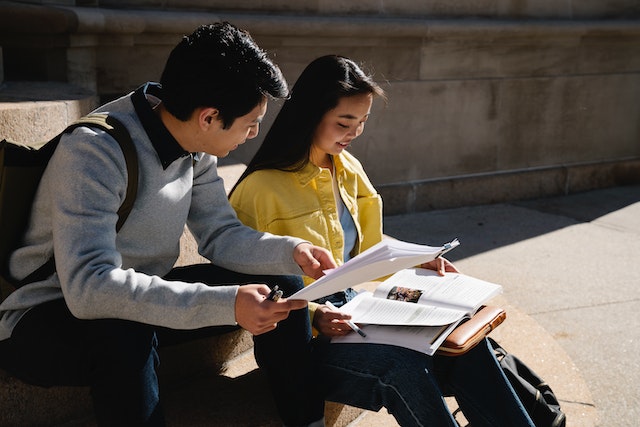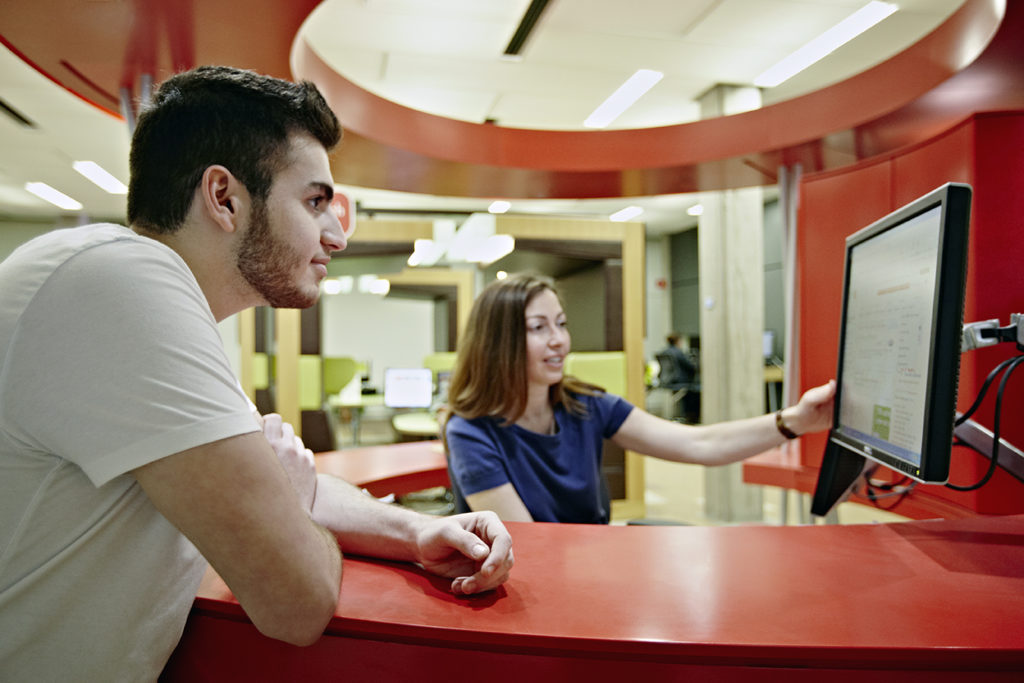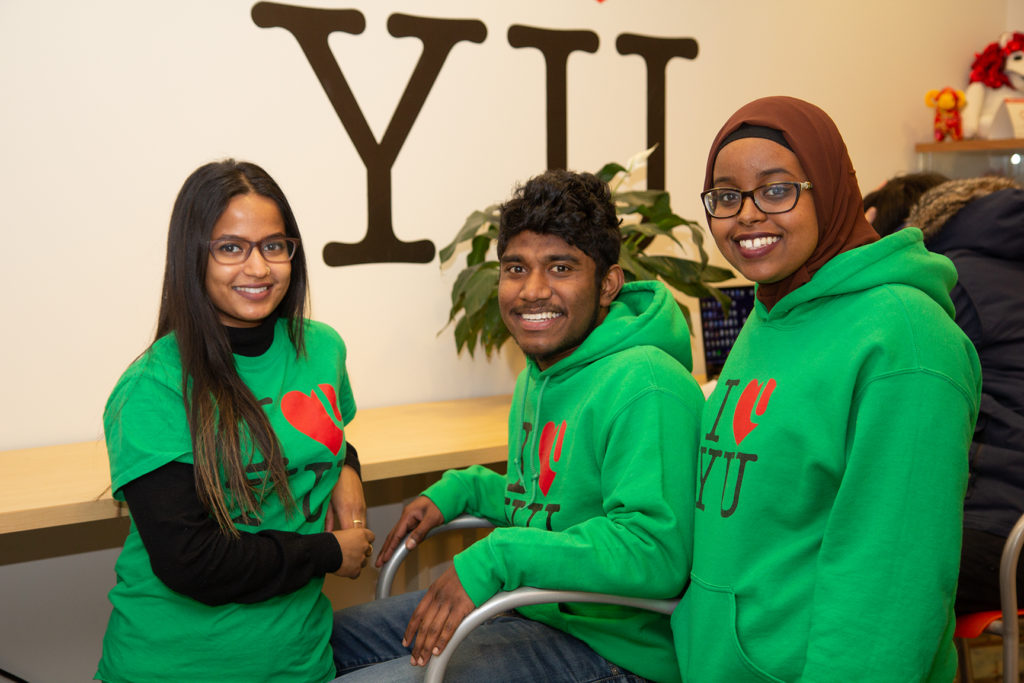Facilities and Resources
Normally, full-time PhD candidates receive a funding package that includes either a full teaching or other assistantship through their eligible years of full-time study. We recognize that full-time study for a PhD involves a long-term commitment and requires at least some financial security and certainty. Full-time MA candidates also normally receive a funding package from York. Note that funding is not available for part-time MA or PhD students. For detailed funding package see Faculty of Graduate Studies - York Graduate Fellowship.
Entrance Awards
There are a number of entrance awards available either through the program, other units on campus, or the Faculty of Graduate Studies which Political Science students are eligible for and have regularly won. These include the Graduate Fellowship for Academic Distinction, the Elia Scholar Award, and the David Leyton-Brown Award among others. The program also offers, the YRC Scholarship in Feminist International Political Economy and the Neal Wood Memorial Award. No special application for any of these awards is necessary; the program automatically considers all eligible candidates.
Applications for these awards, including many others, can be accessed at Faculty of Graduate Studies - Scholarships and Awards.
External Scholarships
There are, in addition to the above, externally-awarded scholarships and fellowships for which qualified students are encouraged to apply (the most well-known of these are the Ontario Graduate Scholarships and the Social Science and Humanities Research Council Scholarships and Fellowships). The program keeps students apprised of the major competitions, and does all it can to aid in the completion of application forms. We are very proud of the enviable record we have achieved in these external competitions.
Please visit Faculty of Graduate Studies - Scholarships and Awards for more information.
Both the Graduate program and the University offer a wide variety of resources and support. The Graduate program in Political Science maintains its own graduate library, with a selection of volumes plus recent issues of the major professional journals and photocopies of articles required in core courses.
Political Science faculty are associated with the Centre for Feminist Research, the Centre for Refugee Studies, the Centre for Research on Latin America and the Caribbean (CERLAC), the Institute for Social Research (ISR), the York Centre for Asian Research (YCAR), the Center for German and European Studies, the LaMarsh Research Centre on Violence and Conflict Resolution, the Robarts Centre for Canadian Studies.
Libraries
York’s collections have more than 6.5 million items, 150,000 E-books and 20,000 online journals. Our world-class libraries provide rich collections, value-added services, excellent librarians and knowledgeable and helpful staff.
Scott Library
This is the largest of York’s many libraries. Scott Library contains thousands of books, journals, periodicals, and other documents, including a very large collection pertaining to Film & Video and the other Fine Arts.
Scott Library is also home to the Graduate Reading Room, a quiet study space for graduate students. Please visit York University Libraries - Graduate Student Support for more information.
Research Centres and Research Institutes
Enhance your interdisciplinary education with opportunities to participate in collaborative research. York University is the leading interdisciplinary research and teaching university in Canada. Working across disciplines and with global partners, we develop ideas and connect with policymakers and practitioners to create meaningful change and a more globally competitive Canada.
As a graduate student, you will benefit from York's 24 research centres and institutes, which provide outstanding research opportunities to supplement your academic program.
The GPSSA is the democratic body that represents the concerns of graduate students in the Department. We elect representatives every September to serve on various committees in the Department and elsewhere in the York Community, such as the Graduate Students’ Association (GSA) and CUPE 3903, which bargains collectively on behalf of graduate and teaching assistants.
The GPSSA holds regular meetings to connect the various representatives and to provide a forum for raising the concerns that you may have as a graduate student, including academic and work-related issues. In these meetings, we also seek to find solutions to our common problems. This year a number of critical issues and challenges need to be addressed both within our Department and graduate studies as a whole, including: collective bargaining for a new contract for teaching and research assistants; the hierarchical restructuring of graduate studies and budget cuts; the lack of full TAships for all PhD students; improving graduate student supervision; growing our graduate run journal, Problematique; building greater community among students in a large department; and promoting greater public exposure for our members and their research through the new GPSSA website.
The GPSSA is also very active in organizing social events for faculty, staff and students. One of the most exciting aspects of graduate life is building lifelong relationships with fellow students and future colleagues. Aside from officially sponsored GPSSA socials, students in our department also convene reading groups, involve themselves in political activism, and also promote a diverse array of artistic, athletic, and social events outside of the department.
| Section One: Aims and Purposes | Section Two: Rules of the GPSSA Meetings |
|---|---|
| The general role of the GPSSA is to establish and advance the common interests of graduate students in the Graduate Program in Political Science by: • Monitoring Department and Graduate program practice and promoting improvement in all facets of the Graduate Programme; • Providing a forum for graduate students to discuss relevant Department and Graduate Programme Issues; • Establishing clear and precise positions on issues of importance to graduate students in the Programme; • Communicating graduate student concerns to Department, Programme and university-wide bodies; • Supporting and promoting social activities among graduate students. | It will be the responsibility of the liaison to provide students with one week written notice of all GPSSA meetings along with a proposed agenda. • The chair shall be elected or confirmed at the outset of each meeting. • The minute-taker shall be elected or confirmed at the outset of each meeting and shall be given appropriate remuneration. • The first order of business for each meeting shall be the confirmation of the agenda. • Meetings of the GPSSA should not normally exceed two hours. |
| Section Three: Procedures for the Establishment of GPSSA Policy Positions | Section Four: Rules for GPSSA Representatives and Liaison |
|---|---|
| The following proposals represent the indispensable and minimal procedures for the establishment of a GPSSA policy position. These procedures focus upon the relationship between motions and GPSSA policy, and do not prescribe by-laws for the development of motions themselves. Generally, Bourinot's Rules of Order regarding motions shall apply. • Policy proposals must be put in the form of a motion, and must be seconded. • Motions are carried by simple majority of those present and voting either in the affirmative or negative. • A successful motion in plenary constitutes the graduate student position as established by the GPSSA. Students are expected to respect the GPSSA policy position as being arrived at in a democratic manner. • All policy positions may be reviewed at subsequent meetings. | The function of GPSSA representatives to Graduate Programmes, Departmental and university committees is to effectively communicate and promote graduate student concerns. In order to ensure that policy making in the GPSSA remains democratic, GPSSA representatives will: • Regularly attend the meetings of the committee to which they have been elected by the Association; • Report to the GPSSA on the agendas and proceedings of their committee; • Review past policy stands taken by the GPSSA; • Return to the GPSSA for policy direction, in the event that GPSSA policy is unclear or non-existent; • Refrain from presenting their personal positions as GPSSA policy |
Click on the following link to know more: Accommodations for Graduate Students

Learn More
The Graduate Program in Political Science at York is an exciting environment to pursue innovative, socially engaging, career-ready education. Contact our Graduate Program Assistant to learn more.









